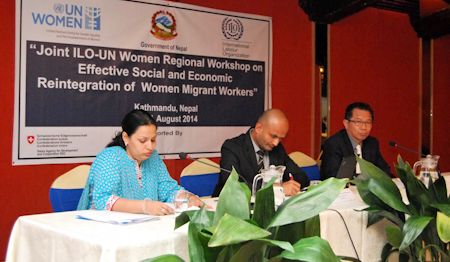Closing remarks by Gitanjali Singh at the regional workshop on the effective social and economic reintegration of women migrant workers
Closing remarks by Gitanjali Singh, Deputy Representative, UN Women at the UN Women and ILO joint regional workshop on the effective social and economic reintegration of women migrant workers, 19-21 August 2014, Kathmandu, NepalDate:

Deputy Representative, UN Women Nepal, Gitanjali Singh (left) presenting her remarks at the joint ILO-UN Women Regional Workshop on Effective Social and Economic Integration of Women Migrant Workers. Seen with her are Mr. Ramanathan Balakrishnan (center) Deputy Regional Director UN Women, Mr. Jose Assalino (right) Director ILO Nepal. Photo credit: Sagun Rai
Distinguished delegates, Ladies and Gentleman, Good Afternoon,
UN Women is pleased to have partnered with ILO in hosting this South South peer exchange on a critical women’s rights issue in close collaboration with the Government of Nepal.
The deliberations over the last two days on the effective social and economic reintegration of women migrant workers have been rich, substantive and frank – a testimony to your commitment to the issue.
It is evident this complex issue requires a range of partnerships at multiple levels. No one Government, international agency or civil society group can alone hope to have an impact. Partnerships will be key to delivering for women migrant workers.
We are at an interesting crossroad with regard to the new development agenda. The interlinked processes of Beijing+20 and the elaboration of the post-2015 development agenda provide a once-in-a-generation opportunity to position gender equality, women’s rights and women’s empowerment front and center on the global agenda, both as an important end in itself and as an essential means to achieve sustainable development.[1] It’s a time for hope and history --------- a new transformative normative agenda, that centre-stages women’s voice, agency and capabilities will address structural barriers to gender based discrimination and inequality --------which lie at the heart of the many of the issues we have discussed over the last two days.
We, at UN Women, believe, that investing in women’s economic empowerment is a direct path towards gender equality, poverty eradication and inclusive economic growth. Growth is inclusive and sustainable only if women are economically empowered to participate in and benefit from it. Not only is this a moral imperative, it also makes good economic sense since women make up half of the human talent base. The remittance data clearly highlights that woman migrant workers are vital economic actors. Therefore ensuring and investing in substantive equality is also smart economics.
Migration is a choice. But the decision to migrate should not lead to hardship. Migrants must have the same human rights as everyone, and laws and policies need to reflect this. At UN Women we are working to ensure that policies and services guarantee the rights of migrants.[2]
This workshop was an important step towards knowledge sharing and for identifying priorities with regard to next steps for the holistic re-integration of women migrant workers and better migration governance. It is clear, reintegration needs to be a critical component from the inception of the migration cycle. The approach has to be multipronged. States parties should design or oversee comprehensive socio-economic, psychological and legal services aimed at facilitating the effective reintegration of returnee women migrant workers[3].
Women migrant workers are an integral and important contributor to Nepal’s socioeconomic development. Migrant women and their families are entitled to opportunities and support. That is an achievable goal. We in Nepal, look forward to building on past initiatives and achievements and taking these recommendations forward under the leadership of the Government and in close collaboration with development partners and civil society organizations.
Last but not least, I would like to again extend our appreciation to the Government and civil society delegations from Bangladesh, Cambodia, India, Laos, Malaysia, Myanmar, Nepal, Pakistan, Philippines, Thailand, Sri Lanka and Vietnam for your active participation and commitment to taking forward the recommendations.
I would like to take this opportunity to thank ILO and UN Women colleagues in the regional and country offices for all their hard work in organizing this workshop. To those of you leaving Kathmandu, today and tomorrow, I wish you a safe journey back home.
Thank you